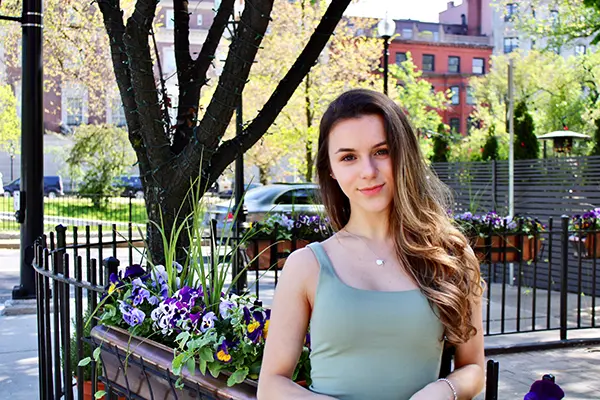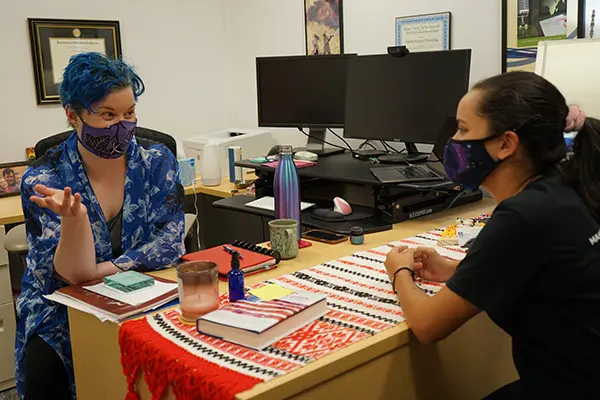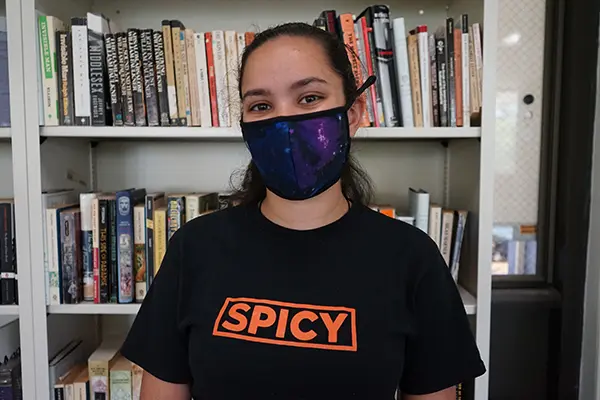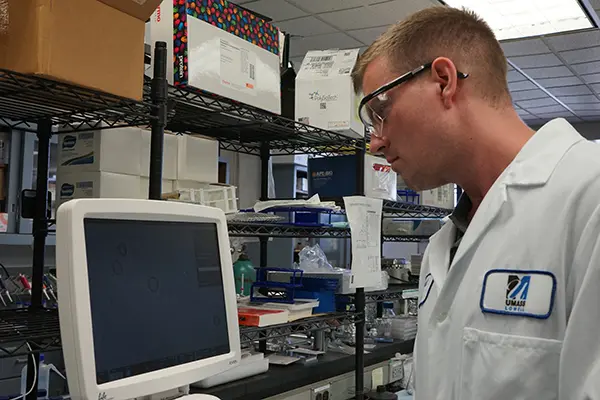Rae Mansfield Offers Honors Classes, Online Workshops on Applying
 Image by K. Webster
Image by K. Webster
02/08/2022
By Katharine Webster
“The best way to get a scholarship is to apply.”
That’s the lesson that honors nursing student Isabella De Souza took away from a series of online workshops led by Associate Director of Honors Scholarship and Curriculum Rae Mansfield, who directs the university’s Office of National Scholarships.
At one workshop, De Souza learned from Mansfield and Fern MacKinnon, director of international experiences and study abroad, that several UMass Lowell students had won Gilman Scholarships from the U.S. State Department for study abroad. De Souza applied for a Gilman Scholarship, writing and revising the three required essays with Mansfield’s and MacKinnon’s help.
She was awarded $4,000 to study “medical Spanish” in Spain, Costa Rica or another Spanish speaking country. She wants to improve her Spanish language skills so she can better communicate with future patients. She says the support she got from Mansfield and MacKinnon made all the difference.
 Image by K. Webster
Image by K. Webster
“They made me feel more confident by looking through my essays and providing that support,” she says. “And I definitely learned about other scholarships I plan to apply for soon.”
Established in 2019, UML’s Office of National Scholarships provides students with information and application support for highly competitive awards that open doors for study, research, international learning and public service experience.
They include the Boren, Fulbright, Gates-Cambridge, Gilman, Goldwater, Marshall, Mitchell, Soros, Truman and Udall scholarships, as well as research fellowships sponsored by the National Science Foundation, the National Institutes of Health, the National Weather Service and other agencies.
Mansfield is now in the third year of offering scholarship application workshops and individual help to any student seeking a national scholarship or research fellowship. So far, the Gilman Scholarship program is the most popular: Six students have won or used Gilman Scholarships in the past year and a half.
Even when students don’t receive the scholarships, the exercise of applying is incredibly valuable, Mansfield says.
“Going through the entire self-reflection you accomplish when you apply for a national competitive scholarship helps you think about what your values are, what your career goals are and what you hope to accomplish,” Mansfield says.
Mansfield, who uses the pronouns “they” and “their,” thinks it’s so valuable that they have incorporated the process into two honors seminars (open to other students, too) that they created: Our Colleges, Ourselves, offered each spring; and Design Thinking and Scholarship Application, held over the summer and during the winter intersession.
 Image by K. Webster
Image by K. Webster
Both classes are intended to help Honors College students figure out their true passions and values earlier in their college careers – and then find the resources to explore and achieve their goals, including crossing the finish line with a meaningful honors capstone project or thesis.
In 2019, Mansfield volunteered to become the head of UML’s new Office of National Scholarships, after UMass President Marty Meehan asked that every UMass campus have a point person in the role.
Mansfield, with help from Susan K. Whitbourne, scholarship coordinator for the UMass system, received a collaboration grant from the National Association of Fellowship Advisors to run a workshop for scholarship advisors at all the state’s 29 public higher education campuses. They discussed best application strategies with representatives from the Marshall, Fulbright, Truman and Goldwater scholarship programs.
Around the same time, Mansfield created the Design Thinking and Scholarship Application seminar specifically to help students research careers, graduate schools and scholarships, create a “Plan A” and “Plan B,” write application essays – and follow through.
Carolina Reyes, an honors student majoring in English with a concentration in creative writing, took the course over the summer and applied for several scholarships through the university’s scholarship portal. While she didn’t get one, she plans to seek out more scholarships to pay for graduate school in education.
She says she got important skills from the class, as well as encouragement to “just keep going with your passion, because there’s always an opportunity behind any and every door.”
 Image by K. Webster
Image by K. Webster
Mansfield also partners with MacKinnon, financial aid and graduate admissions staff and advisors from Career and Co-op Services to run scholarship workshops for both the River Hawk Scholars Academy, a supportive program for first-generation college students, and all undergraduates. Mansfield and the staff members advise students to find research experiences, jobs, internships and co-ops related to their goals – and to strengthen future scholarship applications.
“I always tell them that if they engage in research opportunities, it will make them more competitive,” Mansfield says.
Michael Doane ’19, who graduated with twin bachelor’s degrees in chemical engineering and biology, is the poster child for that. He transferred to UMass Lowell from a community college in California with plans to become a cancer researcher, and he quickly found a work-study job in the lab of Chemical Engineering Prof. Seongkyu Yoon.
Doane then went on to do research with two more professors on campus. Those experiences helped him win a summer NSF Research Experiences for Undergraduates fellowship at the University of Alabama, where he created a computer simulation of glioblastoma cell clusters for use in drug research.
Success followed success. Next, Doane won a $7,500 Goldwater Scholarship for students who plan to pursue academic research careers in the sciences, and in 2018, he was awarded an Amgen Scholarship to work at CalTech on more cancer-related research.
He also won the 2018 Masergy STEM Collegiate Scholarship for separate research with UML’s Haiti Development Studies Center into an anaerobic biodigester that can convert manure into methane gas and fertilizer. And he took advantage of more paid student research opportunities at Lawrence Berkeley National Laboratory and the U.S. Department of Energy’s Joint BioEnergy Institute.
He went on to graduate school in bioengineering at Stanford University, with help from an NSF Graduate Fellowship and a fellowship from the Tau Beta Pi Engineering Honors Society. And he’s now working as a biochemical engineer at Biogen Inc.
“I’m so happy I came to UMass Lowell,” he says. “There’s an abundance of research opportunities and everything’s very progressive. There are so many different programs and entities that all build on each other and combine to give you anything you’re willing to get out of your undergraduate experience.”




